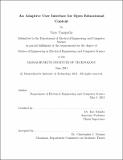| dc.contributor.advisor | Eric Klopfer. | en_US |
| dc.contributor.author | Umapathy, Vijay | en_US |
| dc.contributor.other | Massachusetts Institute of Technology. Dept. of Electrical Engineering and Computer Science. | en_US |
| dc.date.accessioned | 2011-11-01T18:05:55Z | |
| dc.date.available | 2011-11-01T18:05:55Z | |
| dc.date.copyright | 2011 | en_US |
| dc.date.issued | 2011 | en_US |
| dc.identifier.uri | http://hdl.handle.net/1721.1/66706 | |
| dc.description | Thesis (M. Eng.)--Massachusetts Institute of Technology, Dept. of Electrical Engineering and Computer Science, 2011. | en_US |
| dc.description | This electronic version was submitted by the student author. The certified thesis is available in the Institute Archives and Special Collections. | en_US |
| dc.description | Cataloged from student submitted PDF version of thesis. | en_US |
| dc.description | Includes bibliographical references (p. 67). | en_US |
| dc.description.abstract | For my Masters of Engineering thesis project, I have developed a framework of meta- data around open educational resources that are used by students to master a given concept. Based on the assumption that a course can be broken down into specfic concepts and that there are several resources available to students both on sites such as OpenCourseWare and also peer-managed resources like Wikipedia, I develop a model for "relevance" of a resource to the learning of a given concept, where relevance is defined by assignment to a concept by a teacher as well as usage data from students viewing the resources. I combine both active feedback (clicking a "like" button) and passive feedback (view duration and count across all users) to score each resource for a given concept. This score is then used to create an adaptive user interface that indicates which resources may be the most relevant for students learning a given concept based on their peers' feedback. In addition to designing this framework, I provide an implementation of the adaptive user interface on Apple's iPad device, and I provide an evaluation of the educational benefits of this adaptive interface by designing and executing a controlled user study on students in MIT's introductory physics course. | en_US |
| dc.description.statementofresponsibility | by Vijay Umapathy. | en_US |
| dc.format.extent | 67 p. | en_US |
| dc.language.iso | eng | en_US |
| dc.publisher | Massachusetts Institute of Technology | en_US |
| dc.rights | M.I.T. theses are protected by
copyright. They may be viewed from this source for any purpose, but
reproduction or distribution in any format is prohibited without written
permission. See provided URL for inquiries about permission. | en_US |
| dc.rights.uri | http://dspace.mit.edu/handle/1721.1/7582 | en_US |
| dc.subject | Electrical Engineering and Computer Science. | en_US |
| dc.title | An adaptive user interface for open educational content | en_US |
| dc.type | Thesis | en_US |
| dc.description.degree | M.Eng. | en_US |
| dc.contributor.department | Massachusetts Institute of Technology. Department of Electrical Engineering and Computer Science | |
| dc.identifier.oclc | 757176343 | en_US |
